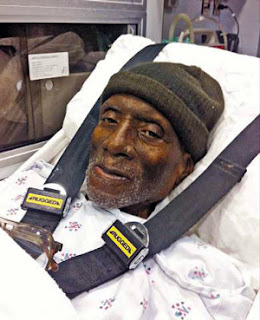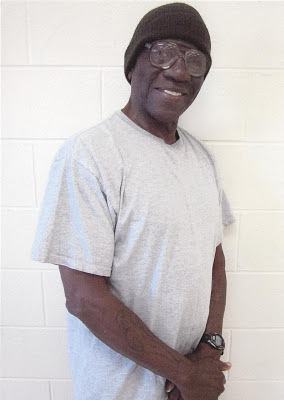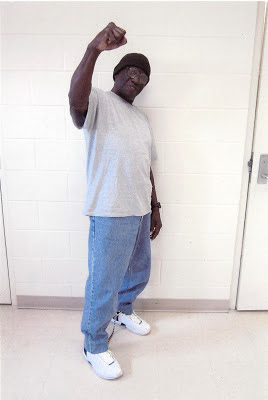UN Special Rapporteur on Torture Demands the Release of Albert Woodfox from Solitary Confinement
Reprinted below is a new statement released today by the Office of the United Nations High Commissioner for Human Rights, demanding Albert Woodfox’s immediate released from solitary confinement.
US: “Four decades in solitary confinement can only be described as torture” – UN rights expert
Mr. Woodfox was convicted of murder together with Herman Wallace, who was released last week when his conviction was overturned on appeal. A day later, on 2 October, Mr. Wallace died after battling cancer, having spent 41 years in solitary confinement.
“This is a sad case and it is not over” stressed Mr. Méndez. “The co-accused, Mr. Woodfox, remains in solitary confinement pending an appeal to the federal court and has been kept in isolation in a 8-foot-by-12 foot (2.5 x 3.5 m. Approx.) cell for up to 23 hours per day, with just one hour of exercise or solitary recreation.”
“Keeping Albert Woodfox in solitary confinement for more than four decades clearly amounts to torture and it should be lifted immediately,” said Mr. Méndez, who has repeatedly urged the US Government to abolish the use of prolonged or indefinite solitary confinement. “I am deeply concerned about his physical and mental condition.”
“The circumstances of the incarceration of the so-called Angola Three clearly show that the use of solitary confinement in the US penitentiary system goes far beyond what is acceptable under international human rights law,” the independent investigator on torture and other cruel, inhuman or degrading treatment or punishment noted.
Mr. Méndez welcomed the federal court ruling of 1 October 2013, but noted that the use of solitary confinement and its negative effects on inmates is widespread throughout the US penitentiary system.
“Persons held in solitary confinement should always be allowed to challenge the reasons and the length of the regime, and should always have access to legal counsel and medical assistance,” Mr. Méndez said.
The human rights expert urged the US Government to adopt concrete measures to eliminate the use of prolonged or indefinite solitary confinement under all circumstances.
“I call for an absolute ban of solitary confinement of any duration for juveniles, persons with psychosocial disabilities or other disabilities or health conditions, pregnant women, women with infants and breastfeeding mothers as well as those serving a life sentence and prisoners on death row,” he said.
The Special Rapporteur addressed the issue of solitary confinement in the US in his 2011 report* to the UN General Assembly and in numerous communications to the Government. He has also repeatedly requested an invitation to carry out a visit to the country, including state prisons in California, but so far has not received a positive answer.
“It is about time to provide the opportunity for an in situ assessment of the conditions in US prisons and detention facilities,” Mr. Méndez reiterated.
Juan E. Méndez (Argentina) was appointed by the UN Human Rights Council as the Special Rapporteur on torture and other cruel, inhuman or degrading treatment or punishment on 1 November 2010. He is independent from any government and serves in his individual capacity. Mr. Méndez has dedicated his legal career to the defense of human rights, and has a long and distinguished record of advocacy throughout the Americas. He is currently a Professor of Law at the American University – Washington College of Law and Co-Chair of the Human Rights Institute of the International Bar Association. Mr. Méndez has previously served as the President of the International Center for Transitional Justice (ICTJ) until 2009, and was the UN Secretary-General Special Advisor on the Prevention of Genocide from 2004 to 2007, as well as an advisor on crime prevention to the Prosecutor, International Criminal Court, between 2009 and 2010. Learn more, log on to: http://www.ohchr.org/EN/Issues/Torture/SRTorture/Pages/SRTortureIndex.aspx
(*) Check the 2011 report on solitary confinement: http://daccess-dds-ny.un.org/doc/UNDOC/GEN/N11/445/70/PDF/N1144570.pdf?OpenElement or http://ap.ohchr.org/documents/dpage_e.aspx?m=103
UN Human Rights Country Page – United States of America: http://www.ohchr.org/EN/Countries/ENACARegion/Pages/USIndex.aspx
For more information and media requests, please contact Ms. Sonia Cronin (+41 22 917 91 60 / scronin@ohchr.org).
For media inquiries related to other UN independent experts:
Xabier Celaya, UN Human Rights – Media Unit (+ 41 22 917 9383 / xcelaya@ohchr.org)





